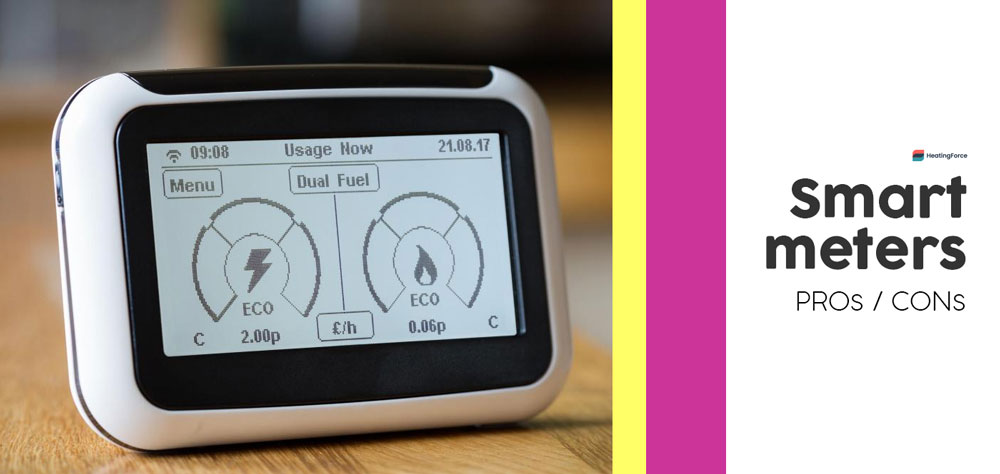PROs and CONs of Smart Meters (UK) In-depth Analysis
In our earlier post, we’ve introduced you to smart meters. We’ve established what the gizmos do, as well as why and when you’re getting one. We’ve even touched on their health and privacy implications, so dreaded by a portion of the public.
In this article, let’s focus on the advantages and disadvantages of smart meters. Perhaps the discussion is absurd – there’ll come a time when you’ll be forced to get one. Many of the ‘discount’ tariffs from big-league suppliers already come with requisite smart meter installation.
But the Government isn’t likely to force your hand. And you should understand what you’re getting yourself into by installing a smart meter if you have such an option.

Before we dissect the issue, for the sake of those of you who haven’t read our previous post, let’s review a bit of background info on smart meters.
What are smart meters?
A ‘smart meter’ is a system that comprises several devices. It includes gas and electricity meters, a communications hub, and an in-home display. Like standard meters, their smart peers track your energy usage in kilowatt-hours. We call these things ‘smart’ because they can:
- transmit your readings automatically
- display your energy usage in pounds and pence
- let you set and track your budgets
While smart meters can go ‘dumb’ and lose all, or parts of their ‘smart’ functionality, you’ll still have a working meter that gives you readings just like your old one did.
Why would my smart meter go ‘dumb’?
In most cases, this loss of ‘smarts’ stems from a supplier switch. The issue concerns first-generation, SMETS1 meters, as SMETS2, their successor, operates on a network common to all suppliers. If you’re not sure whether your meter will stay ‘smart’, or you’ll be stuck with manual readings again, be sure to check with your new supplier before you switch.
In any event, switching can save you hundreds of pounds per year; click here, and you’ll see for yourself. Smart meters are great, but they needn’t stand in the way of economy.
Do I have to pay for a smart meter?
You’re paying for it already through your energy bill, which includes the smart meter rollout fees. There aren’t any other charges unless you feel compelled to tip the installer.
Oh, and if you decline a smart meter upgrade now, then change your mind, you can still get one installed for free later on.
When is the smart meter rollout happening?
The smart meter rollout is well underway. As of 30 June 2020, roughly 16 million smart and advanced meters were running in ‘smart mode’ in households across Great Britain (the technology is not coming to Northern Ireland just yet). Another 4.1 million were operating in standard, or ‘dumb’ mode.
By 2024, the Government intends to see 85% of British households using smart meters, so the rollout isn’t entirely done yet.
Can I get a smart meter already?
Yes – if you supplier can install one in your location. Call your supplier and ask; or, check out this useful link.
What are the advantages of smart meters?
They’re the path to a green, energy-efficient future. Across North America, Europe, and parts of Asia, smart meters are replacing their standard predecessors. Many other regions are testing the technology. Here in the UK, we’re dealing with some delays. Many consumers feel frustrated with all the smart meter back-and-forth and are wondering whether the devices are worth the headache. To obtain an unbiased perspective, let’s summarise the pros and cons of smart meters. We’ll kick off with the pros.
In-home display.
If you’ve ever been fed up with deciphering your standard meter dials, this is the device for you. Today’s smart meters come with a digital in-home display that shows readings clearly.
With this handy, portable little device you can check your monthly usage in kilowatt-hours and see your daily consumption in pounds and pence. So you needn’t pull out your calculator every time you’d like to track your use; the in-home display takes this task off your hands. And that’s not all – the in-home display lets you set a budget and monitor your spending daily.
OK, we’re almost done talking up the in-home display (we’re not selling these things, we promise). Just one more thing: the gadget gives you convenient access to all your account specifics, as well as supplier communications.
Accurate billing.
With standard meters, you and your supplier rely on estimated usage. Smart meters, on the other hand, send accurate readings to the suppliers, so you get the bill for what you’ve used. This way, you don’t build up either credit or debt on your account when the statements don’t reflect your consumption.
Automated meter readings.
Sending your supplier meter readings regularly is the key to accurate billing. With standard meters, you have to take the readings yourself, then send them either via post, telephone, online account, web form, or app. While digital and imperial meters are simple to read, mechanical dials may pose a bit of a challenge. Overall, the reading and submission process is a chore, and that’s precisely what smart meters strive to change. With this new, smart technology, taking and sending readings is no longer your responsibility. You needn’t worry about reading the dials, then posting the card – the smart meter takes care of it with a quick wireless signal.
Access to discount tariffs.
To aid the rollout, many suppliers, notably the ‘big 6’, offer cheaper tariffs if you agree to smart meter installation. You may qualify for the discount price, even if the supplier can’t connect the smart meter in your area just yet. While we don’t know how long these discount tariffs will last, it’s probably a safe bet that you’ll find one while the rollout is still underway.
Flexibility for prepayment customers
Is your current meter working on prepayment mode? Upgrading to a smart meter can give you more control over your account. For instance, you may be able to:
- top up from a smartphone app, without having to visit a shop
- monitor your balance on the in-home display
- enable automated top-ups
With these features, you’re less likely to run out of credit, and you needn’t rely on brick and mortar shops to top up in case you do.
What are the disadvantages of smart meters?
Smart meters may have the edge over their standard peers, but there’s a sizeable chunk of the population that doesn’t see it that way. Several anti-smart meter groups are trying to disrupt the rollout with their media campaigns. Whether you believe their claims or spurn them, let’s have a look at some of the valid smart meter disadvantages everyone should consider before signing up for the upgrade.
You need to let a stranger in the house to install one.
Smart meters make a handy upgrade. But at the height of a respiratory pandemic, your home isn’t the right place to have a stranger poking around for several hours. This is notably so if you, or your loved ones, are vulnerable to the severe effects of Covid-19. Indeed, the pandemic set off a dramatic decrease of smart meter installations across the UK. For now, it may be wise to hold off on upgrading your meter; at least until it’s safe to let a stranger into your home.
The older generation model may go dumb if you switch suppliers.
While the new-generation SMETS2 smart meters are compatible with all suppliers, their SMETS1 predecessor loses its smart functions when the supplier changes.
Should this hold you back from switching? Absolutely not! You stand to save hundreds of pounds per year, especially if you’re ditching a ‘Big 6’ supplier in favour of a smaller company. Just see how much Look After My Bills can save you annually – it’ll take you less than a minute!
Don’t miss out on the savings just because a meter may go dumb. Besides, SMETS1 are slowly getting moved onto the DCC network that all suppliers use; meaning the loss of smart functions may be temporary.
The health effects of smart meters’ wireless signal are not yet fully understood.
Like with any other wireless device, it’s natural to worry about the health risks smart meters may pose. According to Public Health England, which has been studying the effects as the rollout goes on, the RF exposure from smart meters is well below globally accepted guidelines. That’s because their power output is negligible. It’s dwarfed by the RF emissions that other wireless home devices produce. What’s more, smart meters don’t transmit often, only when they’re programmed to send readings. With these facts in mind, the Government’s stance seems credible enough.
But what do independent health authorities think?
Per the American Cancer Society, smart meters’ RF waves lack the power to remove charged particles, or ‘ionise’. Such non-ionising energy can move atoms and create heat but isn’t strong enough to damage DNA.
The International Agency for Research on Cancer (IARC) classifies RF radiation – the type given off by smart meters – as a ‘possible carcinogen’. This conclusion comes from a study that had linked cell phone use to a specific brain tumour but had nothing to do with smart meters.
The conclusion? There’s no conclusion. The technology hasn’t been around long enough to allow for a credible study of its long-term hazards. But, in homes filled with much more powerful RF emitters (think anything with the prefix ‘smart’), what’s the difference?
Smart meters create another channel for wireless transmission of your private data and give hackers access to your power supply.
Smart meters have access to a vast collection of your data. Apart from your account details, smart meters can track your home habits, and detect which devices you’re using. The meters share much of this info with your supplier, although strictly for billing.
But what are the chances of a bad actor using this data for a nefarious purpose? Or, in a more ominous scenario, could a criminal, terrorist, or state hacker disrupt your gas and electricity service? Or worse – the nation’s power supply?
Like any other networked device, smart meters are vulnerable to cyber-attacks.
Conclusion
Barring some abrupt, cataclysmic event, smart meters are on track to be a household staple within the next 10 years. The Government sees these devices as a key to energy efficiency and a green future. Smart meters also offer benefits to consumers like you, such as accurate billing and simple usage tracking.
That said, smart meter upgrades remain voluntary. If you’re swayed by the health and privacy risks or don’t want to let a stranger into your house mid-pandemic, remember – no one can force your hand. The only thing you stand to lose is a discounted tariff from one of the larger suppliers. Luckily, chances are that you’ll still find a better price elsewhere, even without a smart meter – spend a minute and check out your options here at Look After My Bills.
If you feel that we’ve missed anything, or have a personal experience to share, please leave our readers a comment below!
